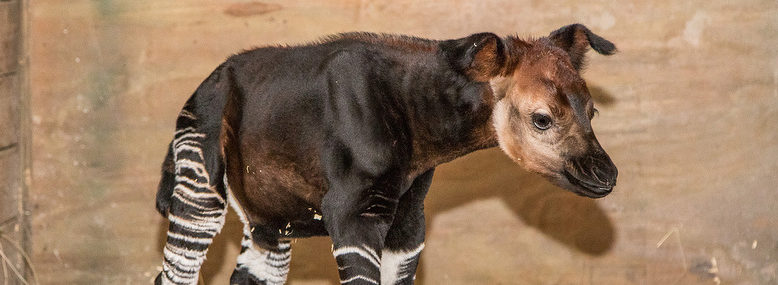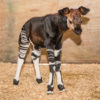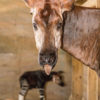The animal care and veterinarian teams at ZooTampa at Lowry Park have welcomed the birth of an endangered okapi calf. Okapi (pronounced oh-COP-ee) are the only living relative of the giraffe and are found in the remote forests of central Africa. The calf was born to parents Betty and Zach who arrived at the zoo in 2006 and are part of the Species Survival Plan of the Association of Zoos and Aquariums designed to help save endangered wildlife. The okapi’s birth draws much-needed attention to a shy animal in desperate need of saving.
“As a natural defense against predators, okapi mothers hide their calves away in nests. The calf will spend its time in the nest leaving only to nurse,” said Chris Massaro, General Curator at ZooTampa at Lowry Park. “While guests eagerly await the calf to venture out into its habitat, we’ll post updates with pictures and videos on social media to share her progress.”
These solitary chocolate brown animals with a face resembling a giraffe and zebra-like striped legs hide within the dense greenery of the Ituri Forest of Democratic Republic of Congo, where conflict and their secretive lives makes studying them a challenge.
“Exact numbers are difficult to determine, but an estimated 10,000 – 35,000 live in the protected reserves in the Democratic Republic of the Congo,” said Massaro. “Unfortunately, their numbers continue to decline, due to human encroachment and hunting, making this an extremely important birth for ZooTampa and the Species Survival Plan to protect wildlife.”
Betty’s prenatal care included regular ultrasounds, a high energy diet and for the first time in this species, a milk-testing method found helpful in horses and rhinoceros to predict Betty’s calving date.
“By increasing Betty’s prenatal care, we saw physical changes that predicted calving,” Dr. Ray Ball, D.V.M., vice president of medical sciences and senior veterinarian at ZooTampa said. “This included a dramatic change in her mammary glands and her hindquarters getting softer in preparation for the birth. The milk sampling also allowed us to determine her milk was good quality and helped us evaluate Betty’s overall health.”
Although shy by nature, Betty is quite comfortable with zookeepers and allowed them to collect milk samples used in the testing. Zookeepers often build strong bonds with the animals they care for which enables higher quality of care for each individual animal.
At 2 years old, the age at which an okapi calf typically reaches maturity and naturally branches out on its own, the calf will likely move to a new home as part of the Species Survival Plan. ZooTampa participates in the Okapi Conservation Project, an international effort to protect the species from extinction, as part of its mission to protect and conserve endangered and threatened wildlife.
For the latest on ZooTampa and other attractions, theme parks and more across the region, be sure to follow Touring Central Florida on twitter @TourCentralFL, @androckb, @Emmet_TCF, @JacobTouringCe1, and give our facebook page a like.



